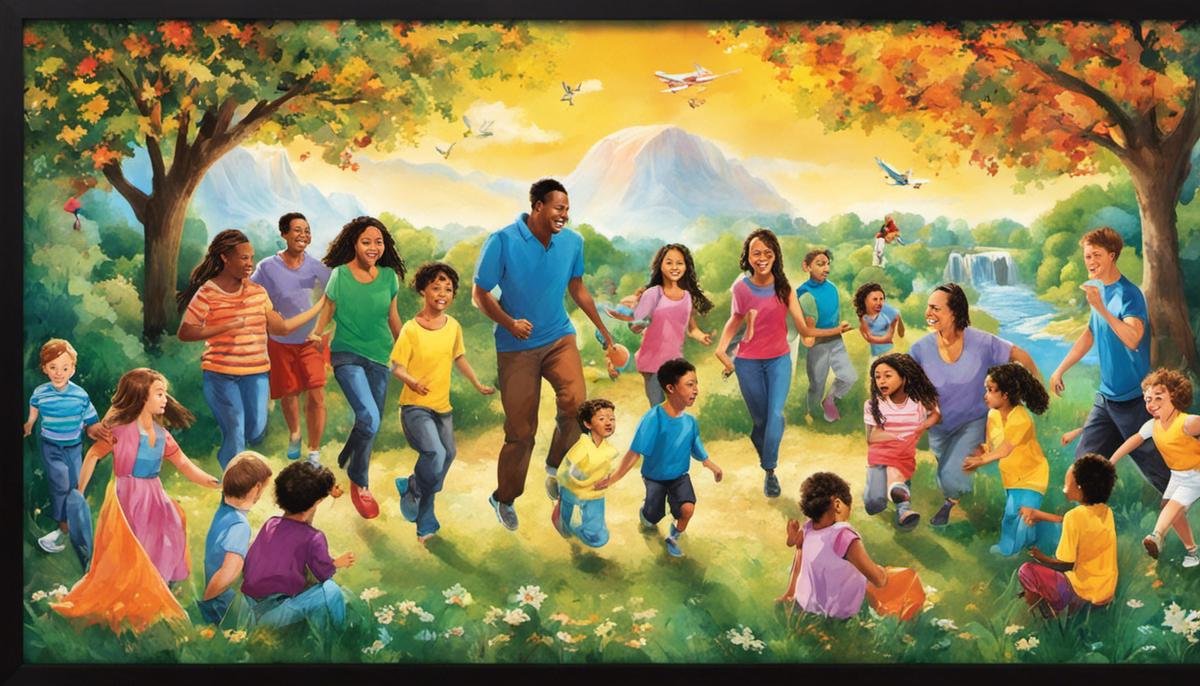
Autism, a neurodevelopmental disorder affecting communication, social interaction, and behavior, has been known to have a deep and lasting impact on not just the individual but also the family. Dealing with autism is a journey that takes many twists and turns, affecting each member of the family in unique ways. While parents’ lives are significantly transformed, siblings also go through their own set of emotional experiences. Through a well-rounded understanding of autism, we can begin to map these journeys and consider ways the community can lend its support. This article aims to shed light on these aspects, providing an insightful exploration into the deeply personal and often under-discussed realms of family life touched by autism.
Understanding Autism
Understanding Autism and its Influence on Daily Life
Stepping into the life of parenting brings a cornucopia of learning experiences. Every child is unique and nurtures distinctive personality traits that mesmerize world around them. Some children, however, exhibit more profound uniqueness that may be linked to disorders like Autism Spectrum Disorder (ASD).
According to the Center for Disease Control and Prevention, approximately 1 in 54 children has been identified with ASD. It’s a complex developmental condition affecting communication, social skills, and behaviors, impacting everyday life uniquely for each child and their family.
Understanding Autism Spectrum Disorder
Autism Spectrum Disorder is a broad term encompassing a range of conditions characterized by difficulty in social interaction, communication obstructions, and repetitive behaviors. It’s called a “spectrum” disorder due to the wide variety in types and severity of symptoms that individuals with autism may present.
While the symptoms mainly show up in early childhood, the precise cause of this condition is unknown. However, it’s presumed to involve both genetic and environmental factors. The diagnosis is primarily made after observing the behavioral pattern of children.
Autism’s Impact on Daily Life
One must understand that it’s a spectrum disorder and its impact largely varies from person to person. Some common manifestations can include:
- Social Interactions: Children with autism may find it challenging to relate with peers, maintaining eye contact, or reading other’s emotions. This could sometimes make everyday interaction a bit of a hurdle.
- Communication: Delayed language development or notable difficulties in conversational skills can be prominent. Non-verbal cues might be misunderstood or missed, leading to struggles in understanding and participating in conventional communication methods.
- Routine-Loving: Changes in the environment or routine may often distress an autistic child. This love for routine and predictability can limit their adaptability to unexpected life incidents.
- Sensory Sensitivity: Autistic individuals often have heightened or reduced sensitivity to sensory inputs like sound, light, taste or texture. This can limit their exposure to varied experiences.
While these challenges may seem daunting, this unique neurodiversity also brings in a fascinating set of skills and strengths. The concentration and focus in fields of interest, in-depth knowledge about particular topics, or exceptional memory skills are gifts sported by many autistic individuals.
Supporting an Autistic Child
Navigating everyday life with an autistic child may invoke the ace juggler inside every parent. Undying resilience, patient efforts with communication, offering clear instructions, providing consistency, and harnessing positivity can go a long way. Ensuring a safe, structured, and predictably scheduled environment is paramount.
Lastly, remember that autistic or not, every child blossoms best under the umbrella of love, acceptance, and understanding. It might be a demanding journey at times, but remember, nurturing their uniqueness would eventually lead to some of the most rewarding moments of a lifetime. Let’s tread this path with a spirit of positivity, creating a world inclusive of all.

Effects On Siblings
When looking at a family unit, the dynamics change when autism spectrum disorder enters the picture. Every member of the family will adapt and adjust in different ways. Let’s shine a light on an often overlooked part of that picture, the siblings of an autistic child.
Siblings stride a unique place in the family dynamic. They’re not a parent, but they’re also more than just observers. For children, their sibling relationships can be their longest-lasting relationships in life; hence, a family member’s autism diagnosis can profoundly impact them.
Understanding feelings can be a tough puzzle even under normal circumstances. Among siblings with a brother or sister diagnosed with autism, feelings of confusion, guilt, anger, or even embarrassment might creep in. They may not fully understand why their sibling behaves unusually; they may feel guilt about why they don’t have the same challenges, or they may be angry that much of the family’s attention is directed towards their sibling with special needs. As parents and caregivers, it would be a meaningful stride to validate these feelings and reassure them that all emotions are okay.
On the brighter side, growing up with a sibling with autism might stimulate a sense of empathy and kindness in the typically developing child. They may grow up to be more compassionate, understanding, and accepting of differences in others. Confronting adversity together, they may grow closer and stronger – resilient even.
Coping with change can be challenging. Life in a family where Autism Spectrum Disorder is present tends to be highly structured, with regular routines to help the autistic child cope. This situation could make it challenging for typical siblings who might want spur-of-the-moment plans or changes to their schedule, which could potentially disrupt the household routine.
This is not to say that all is struggle and strife. There are countless joys and memorable moments of growth for siblings in such families. Regular siblings’ play sessions could help autistic children to improve their social skills and form a deep, loving bond. The siblings might also develop better tolerances and learn to communicate effectively with their autistic sibling, imparting valuable life skills such as patience and understanding.
To cushion these impacts, family support is essential. Regular family meetings where everyone’s feelings can be shared, and each member’s voice can be heard can make a world of difference. Providing opportunities for individual attention to each child can also help balance the dynamics.
A diagnosis of autism in one child in a family undoubtedly impacts all of that family’s members. However, with patience, love, and understanding, all members can not only adapt, but thrive, in this unique family dynamic. Remember, everyone’s journey is unique, and that includes each sibling’s experience with their brother or sister on the Autism Spectrum.
Each day brings its own challenges and triumphs, but taking them on as a family makes the journey a touch lighter and a dash brighter. So, let’s remember to appreciate the small but profound changes that siblings could bring within a family dealing with Autism Spectrum Disorder, acknowledging their part of this picture, as they too are heroes in their own right, handling circumstances that many children may never experience.

Photo by eyeforebony on Unsplash
Impact on Parents
Diving headfirst into the world of parenting a child with Autism Spectrum Disorder can feel a bit like navigating a maze in the dark. Even when the path is lit with love, acceptance, and understanding, there’s no denying the array of emotional and practical challenges that can crop up along the journey.
One of the initial emotional hurdles parents may grapple with is the duel of guilt and blame. It’s not uncommon for a wave of self-blame to sweep over parents, directing questions at themselves like, “Did I do something to cause this?” or “Could I have prevented it?” It’s important to remember: no parent causes Autism Spectrum Disorder. It’s a complex tapestry of genetic and environmental factors, and in some cases, the exact cause remains unknown. Understanding this can provide a certain relief, encouraging parents to focus on what truly matters – loving and supporting their child.
Furthermore, the emotional roller coaster extends to dealing with social stigmas. Society often perceives ‘different’ as ‘wrong’, which can lead to uninformed judgments and hurtful comments. As parents, it’s crucial to act as advocates, educating others about Autism Spectrum Disorder, which can help break down societal misconceptions and foster a supportive community environment for the child.
Another challenge is the heightened levels of parental stress and mental health issues. Ensuring the well-being of an autistic child can take a toll on physical health, emotional resilience, and mental peace. It’s essential for parents to prioritize their own health too. This doesn’t mean parents are selfish; every parent needs to recharge to offer the best version of themselves to their children. Support from professionals, friends, family, or parent groups can be pivotal in combating stress and fatigue.
Practically speaking, the daily life of families with a child on the autism spectrum can look a little different. Constant regularity is often an ally, but maintaining set routines can be a challenging task. Constants can give children a sense of security and minimize anxiety, but it can also restrict family spontaneity and flexibility.
Another pragmatic challenge is the engagement and participation in education. Every child with Autism Spectrum Disorder is unique, and a one-size-fits-all approach in education settings often falls short. Active participation and regular communication with teachers and special educators is essential to ensure the child’s unique needs are met and their capabilities are nurtured in an apt learning environment.
Financial constraints can also weigh on parents. From specialized therapies to educational assistance, the costs can add up quickly. Parents are advised to explore various financial aids and resources available in their community or state.
Raising a child with Autism Spectrum Disorder is undoubtedly a journey filled with emotional tugs and practical obstacles. But just like a diamond emerges under pressure, these challenges often foster an environment of immense love, resilience, and exceptional understanding within a family. An autistic child presents a family with a precious opportunity to explore a different perspective of the world and, in turn, grow closer and stronger together. Giving and receiving love fearlessly, wearing patience like armor, and rejoicing in every tiny victory can make this journey not just manageable, but also incredibly rewarding.

Supporting a Family With a Child with Autism
With an understanding of the foundation of Autism Spectrum Disorder and its impacts on the family, it’s prime time we shift the focus towards the community at large. Acceptance and understanding begin at home, but it does not end there. The society we live in needs to step up to take collective responsibility in embracing these special families. Here’s how we can make a difference.
An important starting point is educating ourselves and others about Autism Spectrum Disorder. Knowledge breeds understanding, and understanding promotes acceptance. Let’s drive contributions to societal understanding of autism by sharing accurate information and dispelling myths.
This ties in with the imperative of reducing stigma and discrimination. Unfortunately, despite progress, misconceptions and prejudices persist. By challenging these, we enable a societal setting where a child with autism feels welcomed rather than isolated.
Let’s also focus on building inclusive societies. Supporting changes in policies towards inclusivity entails availing equal opportunities for all. This includes access to education, healthcare, employment, and recreational activities.
We need to yell out loud – louder for those in the back: equal does not necessarily mean identical! It implies that modifications and accommodations might be required to suit individual needs, and that’s okay.
While we’re at this, don’t forget about the parents and caregivers who devote their lives to advocating for their child’s rights. Remember, they need a supportive network, too. It can be as simple as listening when they want to talk or more involved like offering occasional respite care so they can rejuvenate.
A community can also make a significant difference through fundraising efforts to offset the financial pressure on families. Supporting local organizations that provide resources for families dealing with autism can also go a long way.
It’s also crucial to promote participation in community events for autistic individuals and their families without the fear of judgment or exclusion. This provides a platform for them to interact, learn, and flourish within the community framework.
Remember, it’s okay to ask parents or caregivers questions about autism if you’re unsure about something. Let’s just ensure that it’s done respectfully with the aim to understand better, not to judge or assume. The curiosity signifies a desire to learn, and this openness can build bridges of comprehension and acceptance.
Lastlly, embrace the family. Celebrate the family’s joys and victories, no matter how small, and stand by them in times of challenges. Encourage them, appreciate them, and let them know they are not alone. A small act of kindness can light up their whole world.
Only when each member of the community takes responsibility will we truly cultivate an inclusive society where families dealing with autism not only survive but thrive in all their uniqueness. We’ve got this, together!

The journey of navigating life with autism is a collective endeavor. It’s about understanding and accepting the unique perspective that autism brings to a family’s life. It’s about siblings learning to embrace responsibility while developing compassion, and it’s about parents finding the strength to face their emotions and practical challenges. Each member of the family goes through a process of growth and transformation, and it’s essential that they are not left alone in that process. How a community rallies around them can make a critical difference in their lives. It’s not just about lessening their burden, but also about increasing understanding, promoting inclusivity, and creating a richer, more supportive community for all.





